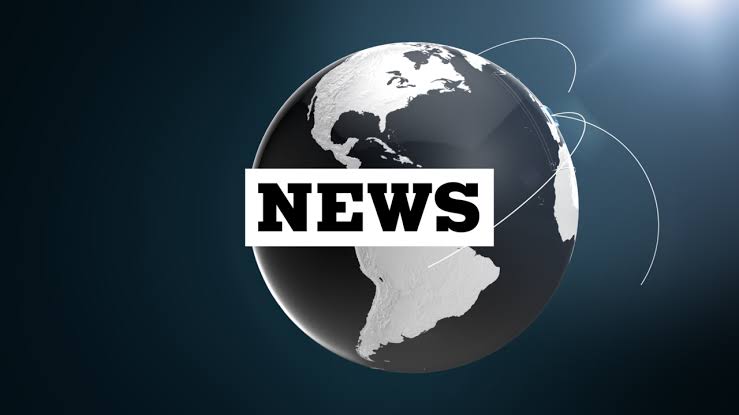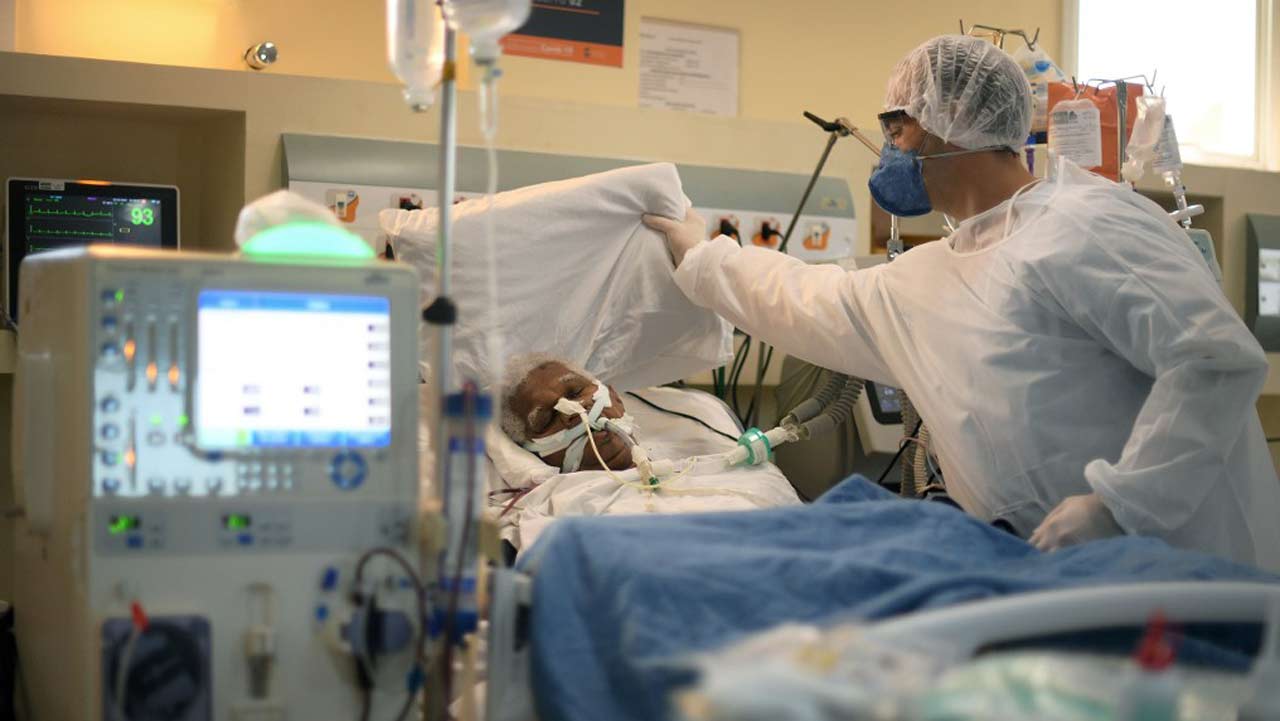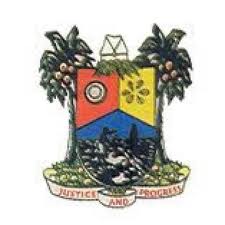The families and friends of quarantined Ebola patients have described the condition their relatives are being kept at the Mainland Hospital, Lagos as "inhumane" and lacking in basic essentials such as antiseptic liquid and toiletries.
A relative of one of the victims receiving treatment said that the condition is so bad that some of those receiving treatment for Ebola have contacted malaria at the isolation centre. He said family member and friends are the ones buying basic essentials such as toilet soaps and bleach.
The man, who did not want his name mentioned for fear his relative could be victimised, said the notion created by the Lagos State government that the patients are being properly catered for is a mere charade. "If people see what's happening here, nobody that has Ebola would come here. They would prefer to stay indoors and die," he said. "Lagos State government said they are taking care of the Ebola patients. But you need to visit where they are. When you do you would find out that the place is a rundown infrastructure. It doesn't have a decent toilet. Some of them are there getting malaria. How can you be treating one sickness and getting another? Family members are having to buy things like toiletries, detergents. We are buying bleach for them to wash hands. "They've been kept in one ward and share the same toilet. What happens to WHO standard that says each patient should be separated from the other? If people know that the government is doing this I don't think anybody would want to come down here to quarantine them. Government says some of them are recovering, why is it that those recovering are in the same room with everybody who is sick?" he asked.
He questioned what the money released for the treatment by the government is being used for when they facility and patients lacks all basic essentials. "Government says they are releasing money. Very soon we would here that they spend so much billions during Ebola crisis but we are here and there is nothing on ground."
Last Friday, the Special Adviser to President Goodluck Jonathan on Media, Reuben Abati, said the President has ordered the immediate release of N1.9 billion "to execute a special intervention plan to tackle the Ebola outbreak."
The relative said though the patients were separated according to sex on Thursday, the facilities in the new wards are nothing better than the old ward. "You would expect that having used an emergency place that was dilapidated when using a new infrastructure it would be uptight and everything would be there but now again it's going to be another big room and there is everybody there. When you wake up in the morning and somebody sitting beside you died, who would that help them to recover? "They are seeing people they used to know dying left, right, and centre, someone died today and he died in the presence of other people and you expect them to recover? Someone should throw light about this so that government can wake up and discover how thing are done. I read countless articles in the paper that everything is fine. Nothing is fine."
A cry for help
Similarly, at a press conference held at Wheatbaker Hotel, Ikoyi, on Thursday, family and friends of other patients decried the condition the patients are being kept and the level of treatment they are getting. They also said that from the kind of treatment the patients were receiving it is clear that the government is overwhelmed by the outbreak. They therefore called for assistance from the international community in general and the American government in particular saying that Patrick Sawyer, the man who brought the disease into Nigeria, was an American citizen.
"What we said is that we are concerned people, everything being said all over is about prevention- wash your hands; do this do that. We are concerned that the people that are there they are now worthless. We as concerned friend and family members we are not happy with what we are seeing, we felt they are not treated well enough. "Let's say we are overwhelmed here in Nigeria. We don't know what to do, we are asking for international assistance and the so called Liberian, he is an American citizen. So the United State of America, they have a responsibility because it's their citizen that brought this scourge into the country," said Helen Boyo-Ekwueme, a retired consultant pathologist. "We cannot just sit down and say we are waiting for them to die. They can be treated humanely. Let's look at the condition under which they are. It can happen to anybody. We as medical people we all know that anything can happen at any time. These people are there we are concerned that they are not properly treated. We can't just be putting everything under the carpet. These people, there is nobody to talk for them and we are concerned that one of our colleagues, a patriotic Nigerian, put herself out did all she could. The matron of that hospital died. The nurse in that hospital died, there other young people, they are on quarantine, nobody is talking about them. Are they being properly treated? People should ask questions. We are not here to lay blames. We are here to ask for assistance. This is a cry for help," she added.
Ladi Okuboyejo, a medical practitioner, said the outbreak has spiralled out of control. She said the help they are seeking has to come urgently because the Nigerian government has been overwhelmed. "But the truth of matter is that an American brought this into our country, the least American can do is to assist us. This is why we are crying for help. This is an SOS call to the international community to come and help us in whatever way. They could have received better treatment. The question we need to ask is that what they are receiving right now, is it the appropriate treatment that should be given? Is there any way we can improve on what is on ground? Are the facilities available to cater for those who are critically ill? Are basic essentials there? Do we have the required personnel?," he said.
"If we say we can do it, the international community would leave us alone. Because we know Ebola is now a stigma. Nobody wants to stick their heads out. If they know that you've been to hospital to visit Ebola victims, people would avoid you. It's that bad. Even medical personnel are running away. There is an urgent need. I don't think we really appreciate the gravity of it. "There is an urgent need for help. And that help can only come from the international community. For us here we feel that government is overwhelmed; which is why we have no option but to cry to the international community to come to our assistance."
The Nigerian government has, however, refuted the claims of the families.
"There is no way we would keep people in isolation without taking care of their needs. They have contacts with their family outside. The have access to their phones they can make calls. We also give the privileges of saying I want A or B or C," said Adebayo Onajole, the Director of Communication and Community Mobilisation, Nigerian Emergency Operations Centre on Ebola Virus Disease.
Mr. Onajole, a Professor, said the government was ensuring adequate treatment for the patients and never mixed those suspected of the disease with those confirmed to have the virus.
"You cannot do infection control by mixing people who have been suspected with people who have been confirmed. At no time do they put them together.
"When we used the word ward. Every patient has a self-contained room. At every time there is what you call continuous disinfection because the only way to contain this is for you to break the transmission circle. All the people attending to them are experts and they are being treated by a case by case basis. You cannot have a generic way of doing things. Each of people have attention on a case by case basis. The number of healthcare volunteers that are working have increased tremendously and this have a reciprocal effect in terms of care that they receive.
"In as much we are not giving them five star services, we are trying as much as we can," he said.
Four people have died of Ebola in Nigeria while six others have tested positive. Three of the four casualties had direct contact with the fourth, Patrick Sawyer, a Liberian-American who brought the virus to Nigeria. The Health Ministry also said on Thursday that 169 people are being observed for the disease.
By Nicholas Ibekwe
Premium Times
ABUJA: Training Schedule for Basic Life Support BLS, Pediatric Advanced Life Support (PALS), Advanced Cardiovascular Life Support ACLS, First Aid, CPR, AED
PORTHARCOURT: Training Schedule for Basic Life Support BLS, Pediatric Advanced Life Support (PALS), Advanced Cardiovascular Life Support ACLS, First Aid, CPR, AED
LAGOS: Training Schedule for Basic Life Support BLS, Pediatric Advanced Life Support (PALS), Advanced Cardiovascular Life Support ACLS, First Aid, CPR, AED




